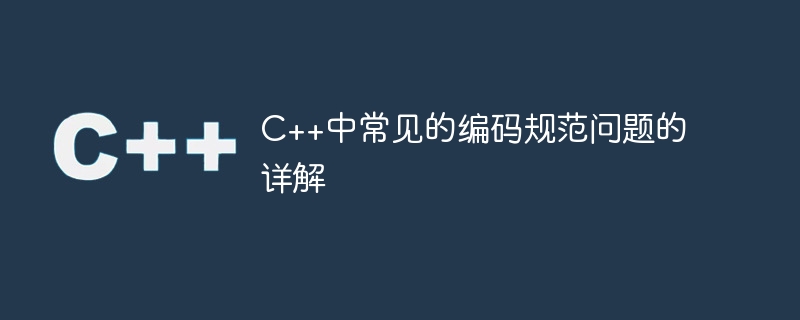

Detailed explanation of common coding standard issues in C
In C programming, a good coding standard is the key to ensuring code quality and maintainability. It can improve the readability of code, reduce the probability of errors, and make team collaboration more efficient. However, many developers often ignore some common coding standard issues in practice, resulting in a decrease in code quality. This article will introduce in detail some common coding standard issues in C and give corresponding code examples.
a) Using a single letter or number as a variable name that is not descriptive, for example:
int a; // 不推荐 int studentCount; // 推荐
b) Using abbreviations in naming Or abbreviated, resulting in poor code readability. For example:
int numStud; // 不推荐 int numberOfStudents; // 推荐
a) Excessive use of meaningless comments in the code:
int a; // 定义一个变量a
b ) The lack of necessary comments makes the code difficult to understand:
int calculate(int a, int b) { // ... }
a) Functions are too long, making the code difficult to understand and maintain:
void processInput() { // 长度过长的代码... }
b) Functions have too many parameters, Making the code difficult to call and test:
void calculate(int a, int b, int c, int d, int e) { // ... }
c) The member variables of the class lack encapsulation and are directly exposed for external access:
class Student { public: string name; int age; };
a) Inconsistent indentation, making the code difficult to read:
if (x > 0) { doSomething(); doAnotherThing(); }
b) Inconsistent placement of braces, making the code confusing:
void doSomething() { // ... }
c) Variable declaration and initialization are scattered, reducing code readability:
int a; int b; int c; a = 1; b = 2; c = 3;
Summary:
In C coding, following good coding standards can improve the quality and maintainability of the code . This article details some common coding standards issues and gives corresponding code examples. By avoiding these problems, we can write more elegant and readable C code, improve team collaboration efficiency, and reduce the occurrence of errors. Therefore, we should always pay attention to coding standards and continue to learn and practice good coding habits.
The above is the detailed content of Detailed explanation of common coding standard issues in C++. For more information, please follow other related articles on the PHP Chinese website!




